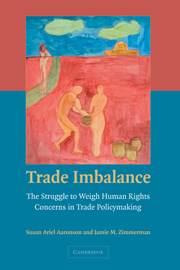Book contents
- Frontmatter
- Contents
- Abbreviations
- Acknowledgments
- 1 Introduction: The Struggle to Weigh Human Rights in Trade Policymaking
- 2 The World Trade Organization and Human Rights: Providing Some Power to the People Some of the Time
- 3 South Africa: In the “Rainbow Nation” Trade and Human Rights Are Anything but Black-and-White
- 4 Brazil: Creating New Rules of the Road
- 5 The European Union: The Behemoth Is Not a Dinosaur
- 6 The United States: At Cross Purposes – Americans at the Intersection of Trade and Human Rights
- 7 Conclusion: How to Right the Trade Imbalance
- Appendix: Interviews for Righting Trade, 2005–2007
- Notes
- Index
1 - Introduction: The Struggle to Weigh Human Rights in Trade Policymaking
Published online by Cambridge University Press: 28 July 2009
- Frontmatter
- Contents
- Abbreviations
- Acknowledgments
- 1 Introduction: The Struggle to Weigh Human Rights in Trade Policymaking
- 2 The World Trade Organization and Human Rights: Providing Some Power to the People Some of the Time
- 3 South Africa: In the “Rainbow Nation” Trade and Human Rights Are Anything but Black-and-White
- 4 Brazil: Creating New Rules of the Road
- 5 The European Union: The Behemoth Is Not a Dinosaur
- 6 The United States: At Cross Purposes – Americans at the Intersection of Trade and Human Rights
- 7 Conclusion: How to Right the Trade Imbalance
- Appendix: Interviews for Righting Trade, 2005–2007
- Notes
- Index
Summary
Overview
If birth and geography are destiny, the citizens of Cochabamba, Bolivia, were determined to change their fate. Although the city lies in a fertile valley near the Rocha River and the Alalay Lagoon, Cochabamba has long had a chronic water shortage. For many years, the people of Cochabamba struggled to obtain enough water to meet their basic needs. The local water utility was poorly managed and barely provided adequate services for the city proper. Moreover, the city was ringed by slums where the government did not provide such basic services as electricity or water.
In 1994, citizens in some of the slums surrounding the city decided to solve their chronic water problem on their own. They dug a well and organized a cooperative that provided clean, plentiful water at a reasonable price to many of the citizens living outside the city proper. Soon, other groups inside and outside the city were emulating this approach.
But, in 1999, the Bolivian government auctioned off the city's water utility as part of a broad-based effort to privatize the state utilities and transportation infrastructure. The government opened up the bidding to all investors, foreign and domestic. A U.S./Italian consortium (controlled by the U.S. company Bechtel) acquired the utility. That utility was granted the rights to neighborhood wells and water cooperatives, even though the cooperatives were not part of the original utility's purview. Moreover, the new water services provider decided the company must invest in a more effective water infrastructure.
- Type
- Chapter
- Information
- Trade ImbalanceThe Struggle to Weigh Human Rights Concerns in Trade Policymaking, pp. 1 - 31Publisher: Cambridge University PressPrint publication year: 2007
- 2
- Cited by



